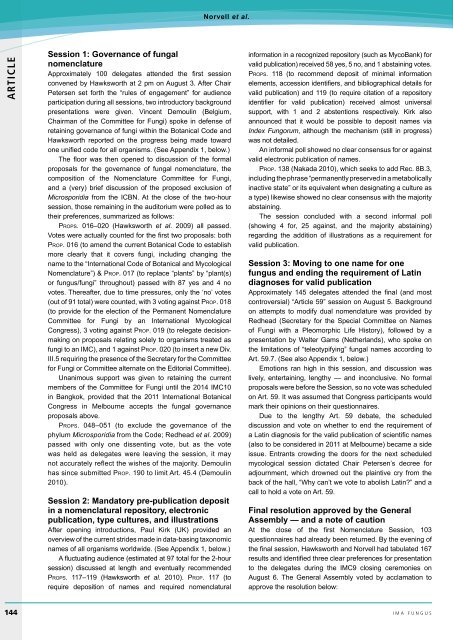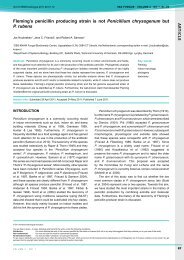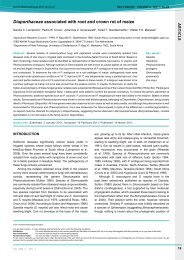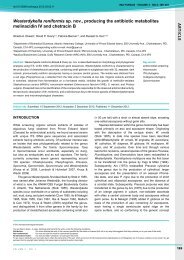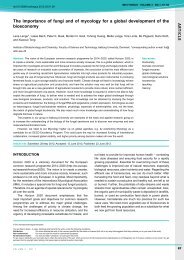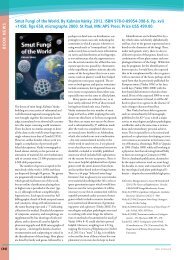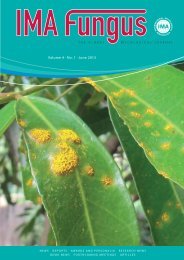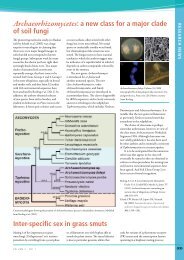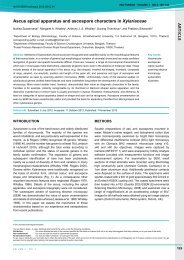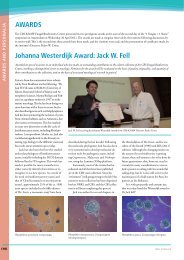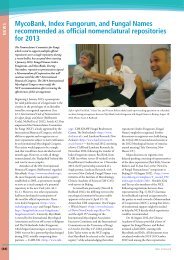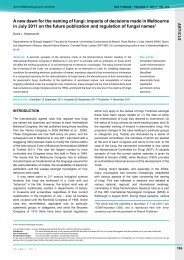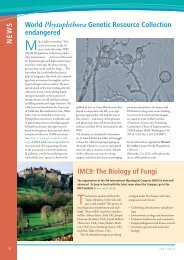Volume 1 · No. 2 · December 2010 V o lu m e 1 · N o ... - IMA Fungus
Volume 1 · No. 2 · December 2010 V o lu m e 1 · N o ... - IMA Fungus
Volume 1 · No. 2 · December 2010 V o lu m e 1 · N o ... - IMA Fungus
You also want an ePaper? Increase the reach of your titles
YUMPU automatically turns print PDFs into web optimized ePapers that Google loves.
<strong>No</strong>rvell et al.<br />
ARTICLE<br />
Session 1: Governance of fungal<br />
nomenclature<br />
Approximately 100 delegates attended the first session<br />
convened by Hawksworth at 2 pm on August 3. After Chair<br />
Petersen set forth the “rules of engagement” for audience<br />
participation during all sessions, two introductory background<br />
presentations were given. Vincent Demoulin (Belgium,<br />
Chairman of the Committee for Fungi) spoke in defense of<br />
retaining governance of fungi within the Botanical Code and<br />
Hawksworth reported on the progress being made toward<br />
one unified code for all organisms. (See Appendix 1, below.)<br />
The floor was then opened to discussion of the formal<br />
proposals for the governance of fungal nomenclature, the<br />
composition of the <strong>No</strong>menclature Committee for Fungi,<br />
and a (very) brief discussion of the proposed exc<strong>lu</strong>sion of<br />
Microsporidia from the ICBN. At the close of the two-hour<br />
session, those remaining in the auditorium were polled as to<br />
their preferences, summarized as follows:<br />
Props. 016–020 (Hawksworth et al. 2009) all passed.<br />
Votes were actually counted for the first two proposals: both<br />
Prop. 016 (to amend the current Botanical Code to establish<br />
more clearly that it covers fungi, inc<strong>lu</strong>ding changing the<br />
name to the “International Code of Botanical and Mycological<br />
<strong>No</strong>menclature”) & Prop. 017 (to replace “plants” by “plant(s)<br />
or fungus/fungi” throughout) passed with 87 yes and 4 no<br />
votes. Thereafter, due to time pressures, only the ‘no’ votes<br />
(out of 91 total) were counted, with 3 voting against Prop. 018<br />
(to provide for the election of the Permanent <strong>No</strong>menclature<br />
Committee for Fungi by an International Mycological<br />
Congress), 3 voting against Prop. 019 (to relegate decisionmaking<br />
on proposals relating solely to organisms treated as<br />
fungi to an IMC), and 1 against Prop. 020 (to insert a new Div.<br />
III.5 requiring the presence of the Secretary for the Committee<br />
for Fungi or Committee alternate on the Editorial Committee).<br />
Unanimous support was given to retaining the current<br />
members of the Committee for Fungi until the 2014 IMC10<br />
in Bangkok, provided that the 2011 International Botanical<br />
Congress in Melbourne accepts the fungal governance<br />
proposals above.<br />
Props. 048–051 (to exc<strong>lu</strong>de the governance of the<br />
phy<strong>lu</strong>m Microsporidia from the Code; Redhead et al. 2009)<br />
passed with only one dissenting vote, but as the vote<br />
was held as delegates were leaving the session, it may<br />
not accurately reflect the wishes of the majority. Demoulin<br />
has since submitted Prop. 190 to limit Art. 45.4 (Demoulin<br />
<strong>2010</strong>).<br />
Session 2: Mandatory pre-publication deposit<br />
in a nomenclatural repository, electronic<br />
publication, type cultures, and il<strong>lu</strong>strations<br />
After opening introductions, Paul Kirk (UK) provided an<br />
overview of the current strides made in data-basing taxonomic<br />
names of all organisms worldwide. (See Appendix 1, below.)<br />
A f<strong>lu</strong>ctuating audience (estimated at 97 total for the 2-hour<br />
session) discussed at length and eventually recommended<br />
Props. 117–119 (Hawksworth et al. <strong>2010</strong>). Prop. 117 (to<br />
require deposition of names and required nomenclatural<br />
information in a recognized repository (such as MycoBank) for<br />
valid publication) received 58 yes, 5 no, and 1 abstaining votes.<br />
Props. 118 (to recommend deposit of minimal information<br />
elements, accession identifiers, and bibliographical details for<br />
valid publication) and 119 (to require citation of a repository<br />
identifier for valid publication) received almost universal<br />
support, with 1 and 2 abstentions respectively. Kirk also<br />
announced that it would be possible to deposit names via<br />
Index Fungorum, although the mechanism (still in progress)<br />
was not detailed.<br />
An informal poll showed no clear consensus for or against<br />
valid electronic publication of names.<br />
Prop. 138 (Nakada <strong>2010</strong>), which seeks to add Rec. 8B.3,<br />
inc<strong>lu</strong>ding the phrase “permanently preserved in a metabolically<br />
inactive state” or its equivalent when designating a culture as<br />
a type) likewise showed no clear consensus with the majority<br />
abstaining.<br />
The session conc<strong>lu</strong>ded with a second informal poll<br />
(showing 4 for, 25 against, and the majority abstaining)<br />
regarding the addition of il<strong>lu</strong>strations as a requirement for<br />
valid publication.<br />
Session 3: Moving to one name for one<br />
fungus and ending the requirement of Latin<br />
diagnoses for valid publication<br />
Approximately 145 delegates attended the final (and most<br />
controversial) “Article 59” session on August 5. Background<br />
on attempts to modify dual nomenclature was provided by<br />
Redhead (Secretary for the Special Committee on Names<br />
of Fungi with a Pleomorphic Life History), followed by a<br />
presentation by Walter Gams (Netherlands), who spoke on<br />
the limitations of “teleotypifying” fungal names according to<br />
Art. 59.7. (See also Appendix 1, below.)<br />
Emotions ran high in this session, and discussion was<br />
lively, entertaining, lengthy — and inconc<strong>lu</strong>sive. <strong>No</strong> formal<br />
proposals were before the Session, so no vote was scheduled<br />
on Art. 59. It was assumed that Congress participants would<br />
mark their opinions on their questionnaires.<br />
Due to the lengthy Art. 59 debate, the scheduled<br />
discussion and vote on whether to end the requirement of<br />
a Latin diagnosis for the valid publication of scientific names<br />
(also to be considered in 2011 at Melbourne) became a side<br />
issue. Entrants crowding the doors for the next scheduled<br />
mycological session dictated Chair Petersen’s decree for<br />
adjournment, which drowned out the plaintive cry from the<br />
back of the hall, “Why can’t we vote to abolish Latin?” and a<br />
call to hold a vote on Art. 59.<br />
Final reso<strong>lu</strong>tion approved by the General<br />
Assembly — and a note of caution<br />
At the close of the first <strong>No</strong>menclature Session, 103<br />
questionnaires had already been returned. By the evening of<br />
the final session, Hawksworth and <strong>No</strong>rvell had tabulated 167<br />
results and identified three clear preferences for presentation<br />
to the delegates during the IMC9 closing ceremonies on<br />
August 6. The General Assembly voted by acclamation to<br />
approve the reso<strong>lu</strong>tion below:<br />
144<br />
<br />
i m a f U N G U S


